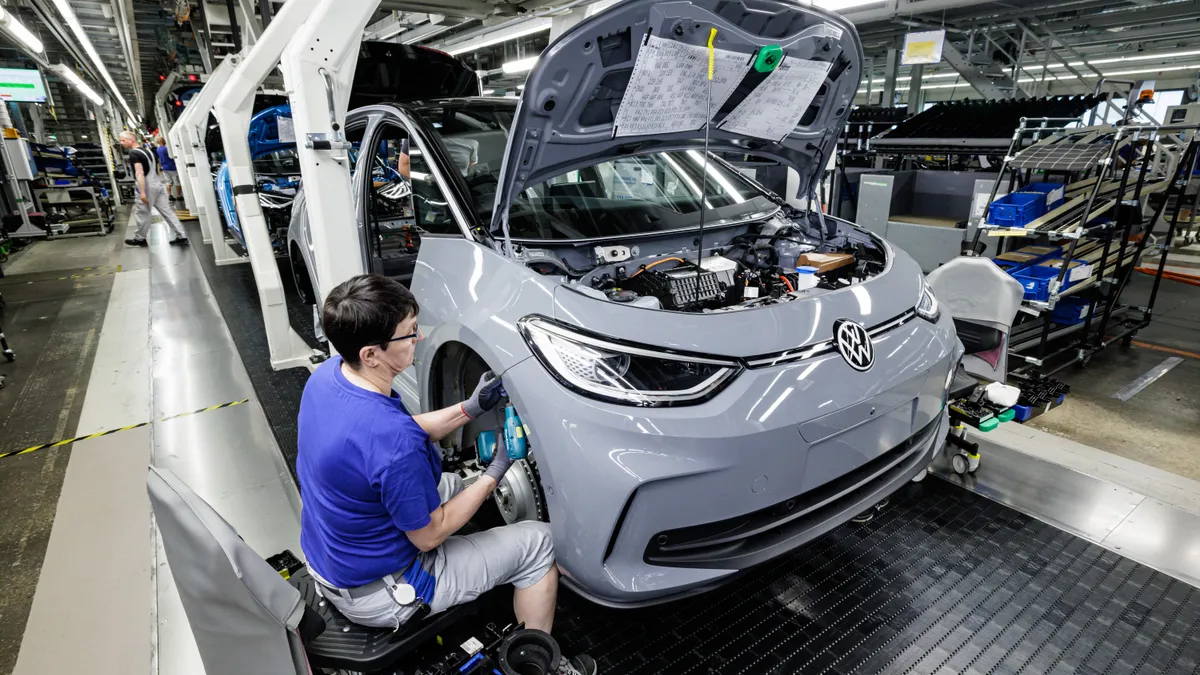With just under five months until the presidential election, some auto and battery manufacturers are concerned about what a shakeup in the federal government could mean for the future of the Inflation Reduction Act.
Passed along party lines with no Republican support in August 2022, the IRA has become a backbone of much of the clean energy manufacturing investment sweeping the country. The law’s tax incentives have encouraged more companies to set up shop in the U.S., with the promise of lucrative credits if they comply with the IRA’s “domestic content” requirements.
Companies have invested more than $124 billion in U.S. clean energy projects since the passage of the IRA.
Ahead of a possible second term for former President Donald Trump, however, manufacturers at a recent industry conference expressed concern that some key provisions of the IRA could be rolled back.
Trump has been outwardly critical of the IRA and other clean energy policies, saying at a rally last fall that President Joe Biden's electric vehicle mandates will "spell the death of the U.S. auto industry."
Trump campaign officials said in a Financial Times report that the administration would seek to cut spending allocated for the IRA’s tax credits, saying their price tags were “wildly understated.”
Sections 30D, 45X could be in danger if Trump wins
Leaders from Volkswagen Group, Samsung SDI and Kore Power discussed the potential fragility of the IRA at last week's Benchmark Mineral Intelligence critical mineral and EV conference in Washington, D.C.
"Stability is the one thing our market needs," said Donald Davidson, senior manager of public policy and strategy at Volkswagen Group of America.
Davidson highlighted section 30D of the law as the most "politically exposed" given its "geopolitical restrictions." Section 30D bars companies' electric vehicles from qualifying for the $7,500 consumer tax credit if the EV's battery components were sourced from a "foreign entity of concern," — four non-allied countries with the U.S., including Russia, Iran, North Korea and, most importantly for automakers, China.
"It's in the newspapers, consumers can feel it," Davidson said. "I could see a future administration trying to ratchet down certain rules in 30D. I could see Republican attempts to repeal 30D."
Last month, the Treasury Department released new guidance that offered automakers much-welcomed time and flexibility to adjust their supply chains to meet IRA compliance surrounding 30D. Automakers now have until 2027 to comply with the law’s foreign entity of concern requirements, and can include graphite in their “hard-to-trace” list of minerals that may be excluded from due diligence until the same year.
A change in administration could roll back that flexibility, said Paul Dorsey, associate general counsel at Samsung SDI America.
"[It's] very concerning anytime there's uncertainty for multibillion-dollar investments," Dorsey said.
The 45X manufacturing tax credits available to companies that establish certain clean energy factories in the U.S., could also be on the line. The tax credits have been an integral aspect of the law's success with companies.
Even a small change to the manufacturing tax credit could have "severe unintended consequences" for the industry, Suzanne Swink, VP of government relations at battery maker Kore Power, said at the conference.
Such changes could be detrimental to the growth of the clean energy manufacturing sector.
"30D is the stick to put our supply chains into the U.S.," Dorsey said. "45X is a huge carrot to drive these decisions. It is a total game changer."
Despite the concerns, Davidson noted that the success of the IRA in driving investment across the country could help protect it.
"45X is more insulated," Davidson said. "Legislators will start to feel the impact of the investments in their communities, [which is] more rationale and realization that these incentives are worth keeping.”















